IWill KK266 Motherboard Review
The KK266 motherboard from Iwill
continues a long standing tradition of providing overclocking friendly solutions. Based on
the VIA KT133A chipset, the KK266 doesn't change all that much from similar KT133A offerings, but that
is not to say it is exactly the same either - indeed it is far
from from an ordinary motherboard. W here
Iwill does differentiate itself, and where in our opinion it does so beautifully,
is by gaining the respect of the hardware community for its' almost legendary ability to hit high Front Side Bus (FSB) speeds!
When VIA
introduced the KT133A chipset, there was actually a bit of disappointment
because almost everyone seemed to expect a DDR chipset. Instead we were
dealt a SDR solution. Of course, to just about everyone's surprise,
the KT133A became quite the sleeper! DDR being such a catch phrase, most people
(including yours truly) forgot that in reality, it only allows twice the
bandwidth of conventional SDR memory but isn't really 'faster.' By that I mean,
the latency stays about the same.
The real
boost VIA gave average Athlon users was official 133 MHz support! Better
yet for overclockers, another tool in the overclocking battle
kit!
| IWill KK266 Motherboard |
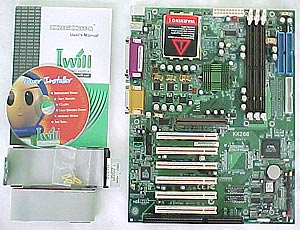 |
Ships with the following:
- IDE CABLE
- FDD CABLE
- Driver CD-ROM
- Instructions
- Spare Jumpers
|
One thing we were taught as kids
were to never judge a book by it's cover, but I must say, Iwill has done a
superb job on their packaging. It really makes the board stand out from the
rest. Well at least by looking at it.
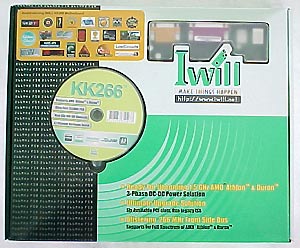 |
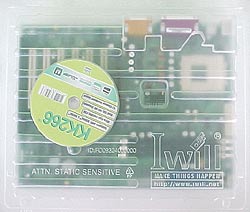 |
| While the packaging does look
quite spiffy, it actually does a good job at protecting the board from
whatever might happen to it. |
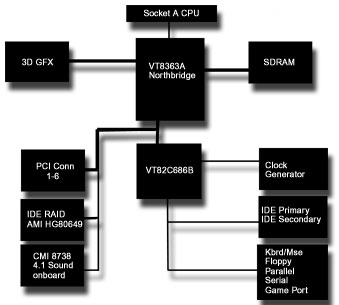
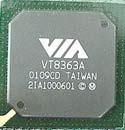 |
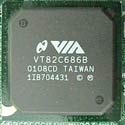 |
| Northbridge |
Southbridge |
The KK266 features VIA VT82C686B Southbridge
in addition to the VT8363A Northbridge. The board supports six PCI cards, one
ISA and comes with optional IDE RAID in the KK266-R flavor. Three 168-pin SDRAM
sockets can tackle up to 1.5GB of memory - more than most of us will ever need.
Onboard audio is standard, but can be toggled off if desired by shorting a
jumper. The 2MB EEPROM Bios from Award is easy to use, and has several important
features the performance user will want to take note of.

